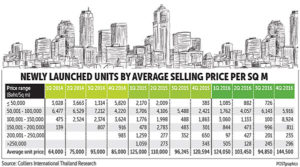
Experts downplay talk of a Bangkok property bubble
Rise in land prices, not speculation, is afoot
Thailand’s property market is far from being a bubble, although prices, particularly for the condominium segment, have risen significantly in the last few years, say multiple experts.
Surachet Kongcheep, associate director of the research department at property consultant Colliers International Thailand, said prices of residential units in Bangkok have yet to exceed homebuyers’ ability to pay, as there is plenty of available supply in the market.
“An average increase in condo prices in Greater Bangkok over the past few years was driven by the greater number of newly launched units in the high-end segment during that period, as they exceeded those in the lower-end segment,” said Mr Surachet.
The larger number of newly launched units in the high-end segment was spurred by a high rejection rate in mortgage loan approvals in the middle-to lower-end segment, which caused many developers to shift to the high-end market.
Mr Surachet said the increase in condo prices was driven largely by land costs, which have risen, on average, 5-6% annually.
Land prices in the central business district saw a much higher average increase, exceeding 10% during 2015-16.
Prasert Taedullayasatit, president of the Thai Condominium Association, said a key area of concern right now revolves around a possible hike of the Bank of Thailand’s policy rate, which might have an impact on housing demand. The middle-to-low-end segment still has a high household debt problem, affecting their ability to secure a home loan, he said.
Siam Commercial Bank’s Economic Intelligence Center (EIC) said that despite a surge in housing prices in Greater Bangkok, it has yet to see any grounds for concern about a possible property bubble in Thailand.
Thailand’s property price increases stem mainly from a continuous rise in land prices, not from speculation as in the Singaporean and Chinese housing markets, the EIC said.
According to the Bank of Thailand, housing prices in Greater Bangkok rose continuously between 2013 and October 2016.
Prices of detached houses and townhouses increased by 8% and 15%, respectively, while unsold units expanded only slightly as the development of low-rise residential units are completed in phases.
Condominium prices grew by 31%, with unsold units expanding by 34% to 68,874 units. This raised concerns about whether price increases came from actual demand for residential units.
But the EIC reiterated the main reason for the price hike in the Thai housing market stemmed from relentless land price hikes.
The land price surge in part resulted from the development of infrastructure megaprojects, such as extensions of the city rail network to suburban areas, new road construction and the expansion of expressways and motorways.
Rising land prices have produced higher new residential project prices. The prices of new residential units in Greater Bangkok were 22 times higher than the annual income of residents in 2015, compared with 16 times in 2013.
Slower income growth compared to property prices has weakened people’s purchasing power and spurred a concomitant reduction in the affordability of residential units.
The EIC said it saw no evidence of a housing bubble in Greater Bangkok, considering the low level of speculative activities. Developers nonetheless should be cautioned when setting prices for new projects.
The decelerating growth of unsold units and new units signal a stalled housing bubble. Nevertheless, financial institutions have been careful and implemented strict lending policies, as reflected in slower growth in commercial bank real estate loans.
In September 2016, their loans grew 3% compared to the same period last year. Moreover, non-performing loans only comprised 4.4% of total real estate loans at the end of the third quarter last year, compared to 4.6% in the same quarter of 2013.
Developers should consider newly launched project price setting as land prices in certain areas have spiked.
Price competition across different types of projects in the same area, such as between townhouses and condominiums, may also increase the number of unsold units, it warned.
Source: http://www.bangkokpost.com/business/news/1181457/experts-downplay-talk-of-a-property-bubble


